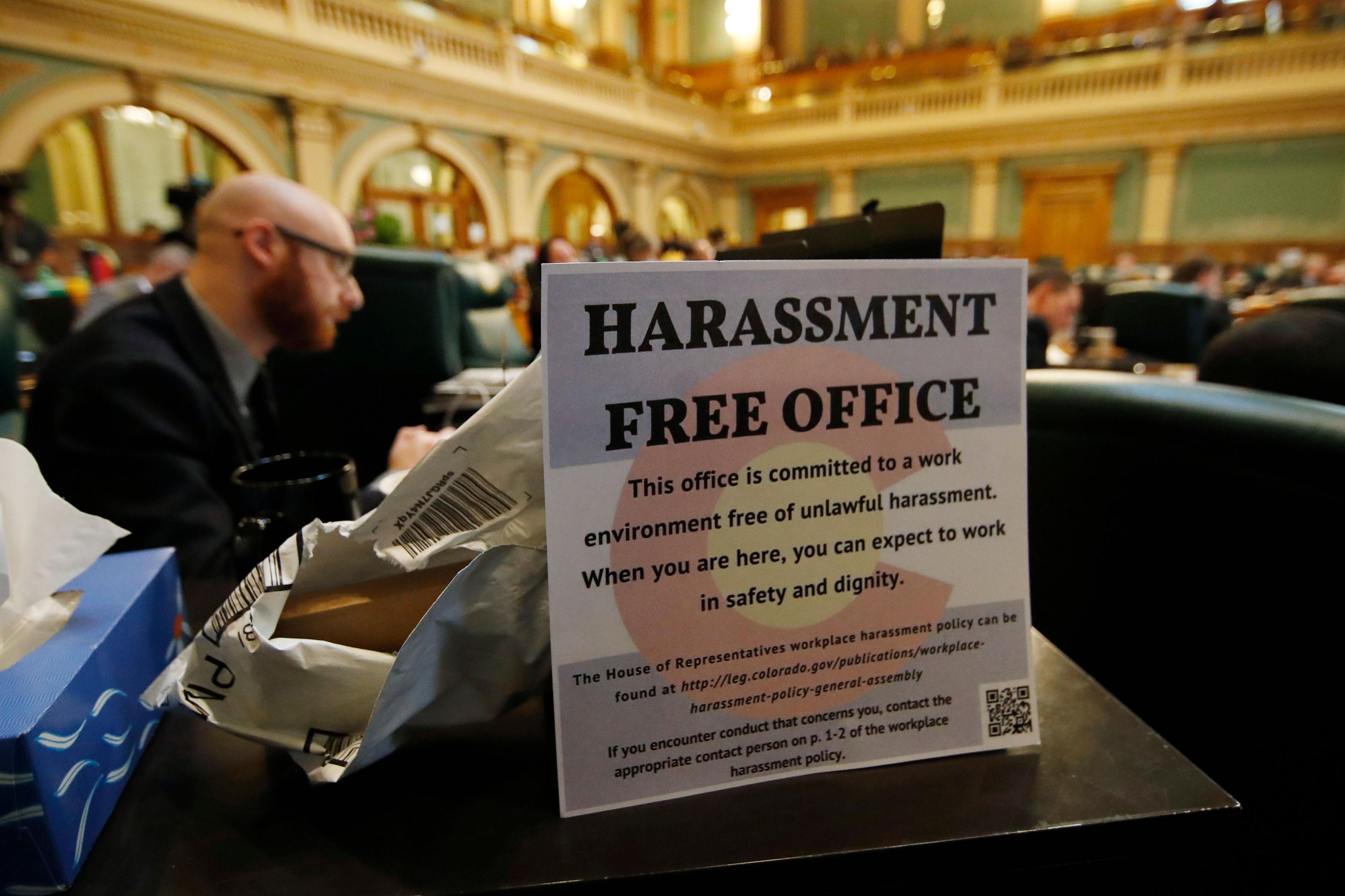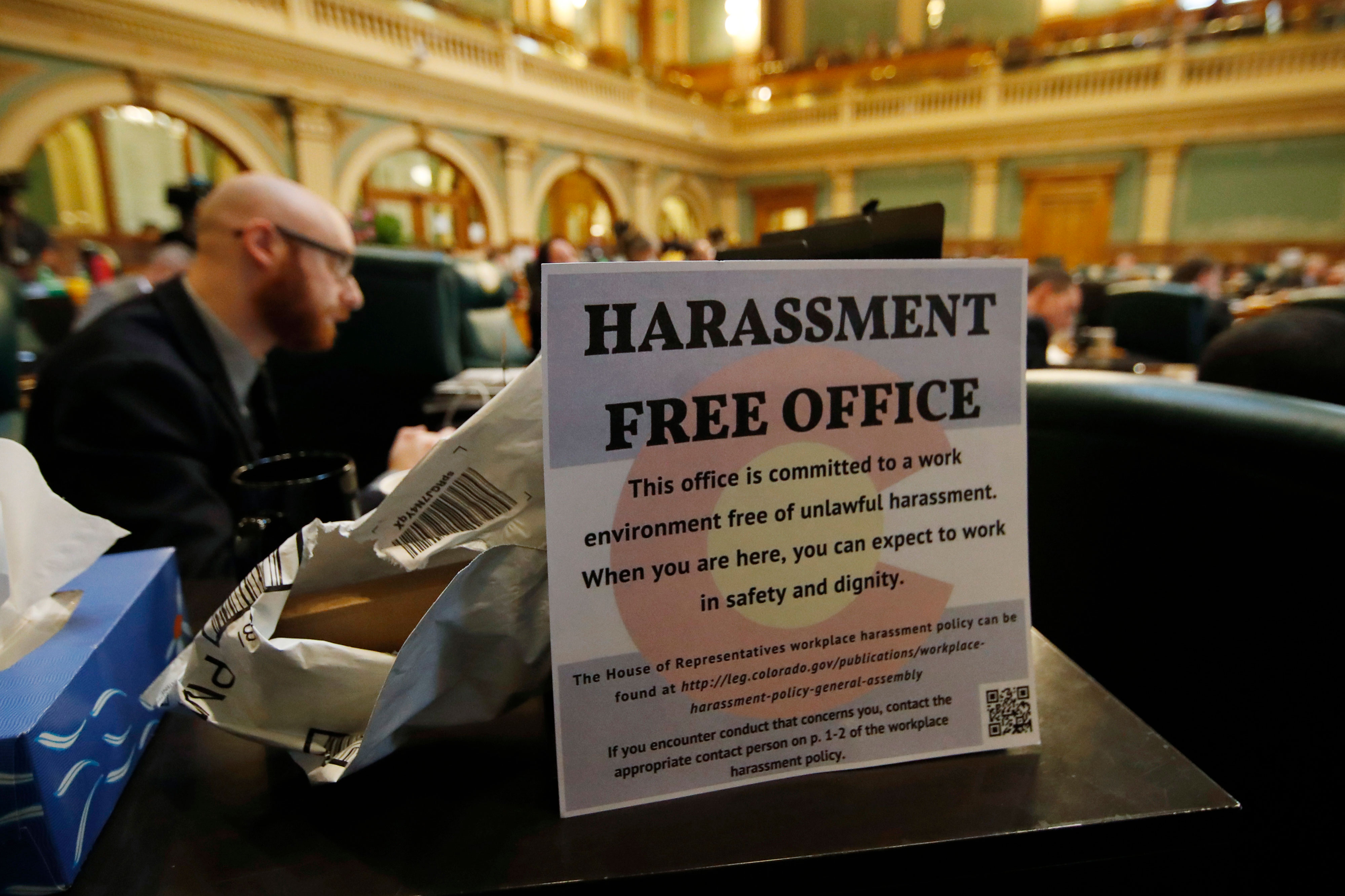

Colorado lawmakers meet Thursday to continue to examine improvements to the state capitol’s workplace culture.
The legislature created the interim committee after sexual harassment allegations from more than a dozen people against four sitting lawmakers were investigated and found to be credible. In the 2018 session’s most dramatic turn, former Democratic Rep. Steve Lebsock became the first lawmaker expelled from office in 103 years.
The allegations not only rocked the capitol but showed flaws in the overall system for reporting and preventing workplace harassment. Colorado hired an outside consultant — Investigations Law Group — to study the culture, recommend changes and come up with a “turnkey approach.”
The report generally found that people felt safe working at the capitol. However, the report said 30 percent saw or experienced harassment, and “50 percent of people have observed sexist behavior and/or reported episodes of seriously disrespectful behavior.”
The findings of the Investigations Law Group will serve as the base point for Thursday’s discussions.
Comprised of three members from each party, the goal for the committee is to put their names behind legislation that should be introduced next session. That bill would still need to pass the House and Senate and be signed by the next governor.
Lawmakers will decide whether to hire additional Human Resources staff after the first ever legislative HR person was hired earlier in 2018. Other issues to settle: What role should legislative leaders play in overseeing complaints against colleagues? And should they be the ones in charge of determining consequences, as the current process dictates. Then there’s the idea of setting up an informal complaint process and looking at which records and investigations should be a public record, and if an accuser can file a complaint anonymously.
Additional Colorado Recommendations
- The General Assembly’s policies, rules and procedures must be updated, including reporting options and complaint handling.
- Retaliation is a real concern that is not adequately addressed in the present system.
- The partial confidentiality in the present system undermines the process and should be redressed.
- Accountability for misbehavior in the political arms of the institution should be strengthened, made consistent and be proportionate.
- The complaint intake and resolution process needs to be professionalized, enhanced and centralized.
- Effective training and outreach should be a priority to enhance positive culture change and reflect best practices.
- Improve the policy to expand complaint contacts, including an anonymous option, while centralizing responsibility for handling, resolution and tracking.
- Professionalize and standardize the response to complaints.
- Add in the option of going to a confidential Ombudsperson.
- Craft an informal resolution process designed to intercept and correct misbehavior at an early stage, and give it remedial resources.
Colorado lawmakers aren’t alone. Actions against sexual misconduct, prompted by the #MeToo movement, pushed many state legislatures to reconsider their internal policies and state laws on the issue. An analysis by The Associated Press found that about half of House and Senate legislative chambers nationwide have taken no substantive action this year. The rest have adopted measures that have addressed a variety of issues, including training, investigations and public disclosure of sexual harassment complaints.
Here are some examples of the changes made by other state legislatures:
Training
Michigan: New policies require lawmakers in both chambers to participate in annual training. House members previously were required to take anti-harassment training only once after they first were elected, though they can serve up to six years. Senators, who can serve up to eight years, previously were required to receive training once for each four-year term.
Missouri: The Senate previously had required lawmakers and staff to undergo sexual harassment training only once upon starting work, even if senators remained in office for the maximum eight years and staff worked for decades. A new policy requires senators and staff to take a computerized training program within 30 days of starting work and again every other year. That still falls short of a 2015 House policy, which requires annual in-person training for representatives and staff.
External Investigations
California: Outside experts will be tasked with substantiating claims under a new legislative sexual misconduct policy that is expected to take effect in early 2019. The Legislative Counsel’s Office will house a new investigative unit to handle complaints. Five outside experts — three appointed by the chief justice and one each by the Senate and Assembly — will review the findings to determine whether the actions violated legislative policies and recommend discipline. Lawmakers still will have the final say on punishments.
New Mexico: A new sexual harassment policy enacted just before the start of the 2018 legislative session requires the involvement of an outside counsel when accusations are made against lawmakers. The policy was put to the test when a lobbyist in May accused Democratic Rep. Carl Trujillo of inappropriate advances to her in 2013 and 2014. A special counsel determined in July that there was credible evidence for the claims. The next step will include an open hearing on the matter before a panel of legislators.
Public Disclosure
Louisiana: The state’s first government-wide law on sexual harassment policies will take effect Jan. 1. It will require agencies to compile annual reports documenting the number of employees who have completed the training requirements, the number of sexual harassment complaints received over the last year and details about spending associated with settlements and litigation.
Washington: Under a new Senate policy, records related to an investigation of sexual harassment will be released publicly once an investigation and appeal is completed — if the case is deemed to be “in the public interest,” such as involving a senator. The policy maintains the confidentiality of those who lodged the complaint.
Public Funds
Illinois: A new law that took effect Aug. 10 prohibits public money from being paid in exchange for a person’s silence or inaction related to allegations of sexual harassment against state lawmakers.
Kansas: The new state budget prohibits the use of state dollars to settle sexual harassment claims against elected officials or state employees and bars agencies from using their funds to pursue non-disclosure agreements in settling claims. Because the ban is included in a budget bill, not a general law, it remains in effect only through June 2019.
Secrecy
New York: A new uniform policy addressing harassment at all levels of government bars secret settlements and requires government officials found liable for harassment to pay their own costs in legal actions. The state had a history of using confidential settlements, including a secret $103,000 payment to settle harassment complaints by staffers against former Assemblyman Vito Lopez in 2012.
Tennessee: A law that took effect in May prohibits employers from requiring employees and job applicants to sign non-disclosure agreements about sexual harassment as a condition of employment.
Private Employers
Maryland: A law taking effect Oct. 1 will prohibit employment contracts that waive procedural rights to remedy future sexual harassment or retaliation claims, such as requirements to settle complaints through arbitration. It also will requires businesses with at least 50 employees to submit public reports to the Maryland Commission on Civil Rights. The reports are to include the number of sexual harassment settlements, how many involved confidentiality agreements and how often the businesses have paid settlements resolving allegations against the same employee over the past 10 years.
Vermont: A new law prohibits businesses from requiring employees to sign away their right to report or sue for sexual harassment, and prohibits settlement agreements from including provisions that say the employee cannot work for the business in the future. It also creates an online portal to report harassment and allows the attorney general’s office to enter workplaces to investigate sexual harassment complaints.
The Associated Press contributed to this report









